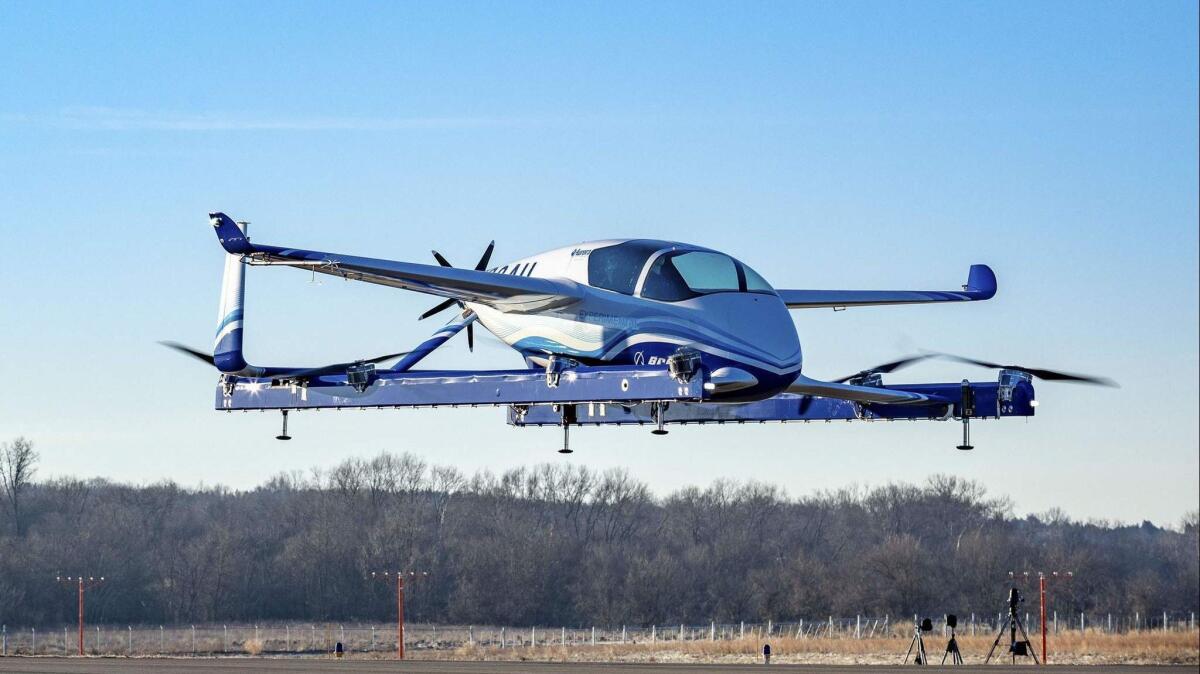Boeing flying taxi completes first successful test flight

- Share via
A Boeing Co. “flying car” designed to whisk passengers over congested city streets and dodge skyscrapers completed its first test flight Tuesday, offering a peek into the future of urban transportation the aerospace giant and others are seeking to reshape.
A prototype of its autonomous passenger air vehicle completed a controlled takeoff, hover and landing during the test conducted in Manassas, Va., the maker of military and commercial jets said in a statement Wednesday.
The electric-powered model is designed for fully autonomous flight, with a range of 50 miles. Though often referred to as a “flying car,” it has more in common with a helicopter.
The Chicago-based plane maker and archrival Airbus SE are among a slew of companies racing to stake a claim on flying cars and parcel-hauling drones, which have the potential to be the next disruption to sweep the aerospace industry. Boeing’s push was boosted by a 2017 acquisition of Aurora Flight Sciences, whose projects include a new flying taxi it is developing with Uber Technologies Inc.
Others are also rushing rotorcraft concepts to market. Vahana, the self-piloting air taxi developed by A3, Airbus’ tech-centric Silicon Valley outpost, completed its first test flight last year. Intel Corp. and EHang Inc. are also testing their flying vehicles.
Morgan Stanley analysts, in their most bullish estimates, predict such technology could lead to a $2.9-trillion industry by 2040, while their most pessimistic view pegs the value at about $615 billion.
Boeing’s urban air mobility arm, Boeing NeXt, enlisted Aurora to design and develop the prototype. The company didn’t say if the model is the one being developed for Uber. Boeing NeXt’s portfolio also includes a fully electric cargo air vehicle — designed to transport as much as 500 pounds — which completed its first indoor flight last year and is slated for outdoor testing this year.
Future flights of the 30-foot-long, 28-foot-wide PAV air-taxi prototype will test forward, wing-borne flight and the transition phase between vertical and forward-flight modes, according to the Boeing statement. The company will also continue testing to advance safety and reliability of the aircraft, it said.
Airbus SE’s prototype flying taxi will take to the skies in coming weeks after powering up for the first time toward the end of last year.
The CityAirbus will be tested at the plane maker’s helicopter plant in Donauworth, Germany, the company said Wednesday. Initial flights will be unmanned as Airbus seeks to establish the four-seat model’s capabilities for full autonomy and focuses on tests that don’t require a pilot.
Resembling a larger version of hobby drones, the CityAirbus is designed to operate within urban environments at three times the speed of average road vehicles. The aircraft, which is propelled by electric motors and can take off and land vertically, could enter service as early as 2023.
Flight testing will begin with brief takeoffs, building up to longer missions, Airbus Helicopter spokesman Guillaume Steuer said. Should the project get the go-ahead, the model would fly either with a full load of passengers or three passengers and a pilot, depending on the regulatory situation at the time.
More to Read
Inside the business of entertainment
The Wide Shot brings you news, analysis and insights on everything from streaming wars to production — and what it all means for the future.
You may occasionally receive promotional content from the Los Angeles Times.










